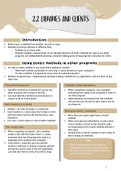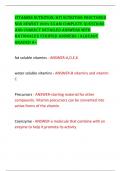Summary
Summary CS114 - 2.2 Libraries and Clients
- Course
- Institution
- Book
Summaries from the "Introduction to Programming in Java" textbook to assist in quick studying and revision for tests and exams. Be sure to look at the bundles to buy several chapters at a much lower price. Please note these notes only include summaries for Chapter 2.2 and further summaries will be ...
[Show more]







